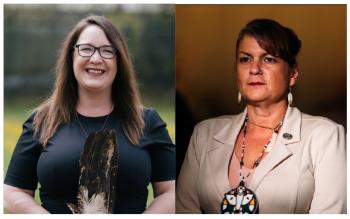Image Caption
Summary
Local Journalism Initiative Reporter
Windspeaker.com
The Ontario Native Women’s Association (ONWA) will be able to greatly expand one of its programs thanks to new funding from the provincial government.
It was announced this past Thursday, which coincided with United Nations Human Rights Day, that the ONWA would receive $10.8 million over the next five years from the Ministry of Children, Community and Social Services.
These funds will enable ONWA officials to expand its program called Aakode’ewin—Courage for Change. Since 2017 the program has helped save 89 Indigenous women and girls that were victims of human trafficking.
Aakode’ewin supports Indigenous women and girls, who are either currently embroiled in or are survivors of human trafficking.
The program includes 24/7 crisis response, harm reduction and safety planning services, as well as individual support with referrals to counselling, healthcare and addiction services.
The program was launched in 2017 in Thunder Bay. Since its inception the program has only expanded to Toronto. But now, thanks to the new provincial funding, the ONWA will be able to branch out to 10 other locations—Timmins, Ottawa, Greenstone, Kenora, Napanee, Sioux Lookout, Midland, Peterborough, Hamilton and Niagara Region.
These locations are deemed priority spots and will have programming offered through Indigenous organizations in those communities.
For example, a program partner will be the Niagara Chapter of Native Women, based in Fort Erie. This is deemed a priority area not only because of the current lack of programming, but also because of its proximity to the United States border and the city’s popular tourism sector.
The funding for the ONWA’s project was part of the province’s five-year, $46 million commitment to increase services for victims and survivors of human trafficking through its Anti-Human Trafficking Strategy.
Funding for 27 projects was announced through the Indigenous-led Initiatives Fund and the Community Supports Fund.
ONWA’s executive director Cora McGuire-Cyrette said about 200 programs applied for some provincial funding. She’s thrilled her association will be one of the recipients.
“We’re very ecstatic over it,” she said. “I know it’s because we’ve been leading in this area for a number of years.”
ONWA officials had put in a proposal for $27 million in funding.
“We would have been able to expand into even more communities,” McGuire-Cyrette said.
“This is just the beginning. But we will be able to address the gap that we have been seeing across communities.”
With its new provincial funding, ONWA officials are looking to hire 25 employees to help service their new program locations. These hirings will take place as soon as possible and employees will commence their training immediately.
The ONWA is then planning to open its 10 new centres across Ontario in the spring.
“We are targeting for an April or May start across the province,” McGuire-Cyrette said.
ONWA President Dawn Lavell Harvard was also pleased the provincial government stepped up to provide funding to the association’s program.
“It’s an acknowledgement of the problem that exists, but even more so of the work we took to develop this type of program,” she said. “This shows we have been at the forefront of this issue for a while.”
Lavell Harvard was especially happy to see the government funding will be over a five-year period.
“I think one of the most important aspects of this commitment is that it is a multi-year agreement,” she said.
Combating human trafficking is no easy task, Lavell Harvard added.
“That’s not a short process,” she said. Sustained support is required.
“You can’t wrap it up in a few months. So often governments offer pilot projects. This shows a recognition of the depth of the problem that we have with human trafficking in Canada.”
Lavell Harvard said she was also happy the province stepped up while the pandemic is going on.
“I’m really pleased to see they didn’t let this important issue get dropped,” she said. “This is a very good recognition of the problem and that they’re doing something about it.”
Like McGuire-Cyrette, Lavell Harvard is not complaining with the amount of funding the ONWA will get from the Ontario government.
But she said the estimated $11 million that is forthcoming will not solve human trafficking issues in the province.
“We will continue advocating (for more funding),” Lavell Harvard said. “There is always so much more needed than what we have the resources for.”
Lavell Harvard added ONWA’s current employees often go above and beyond their duties.
“We will continue doing more than what is expected,” she said.
Local Journalism Initiative Reporters are supported by a financial contribution made by the Government of Canada.

